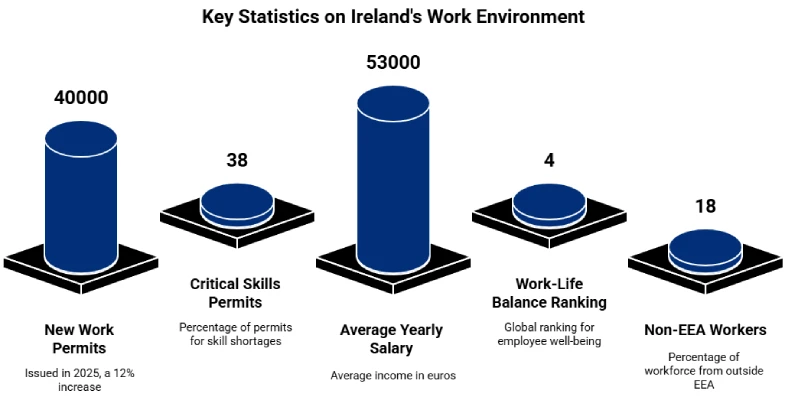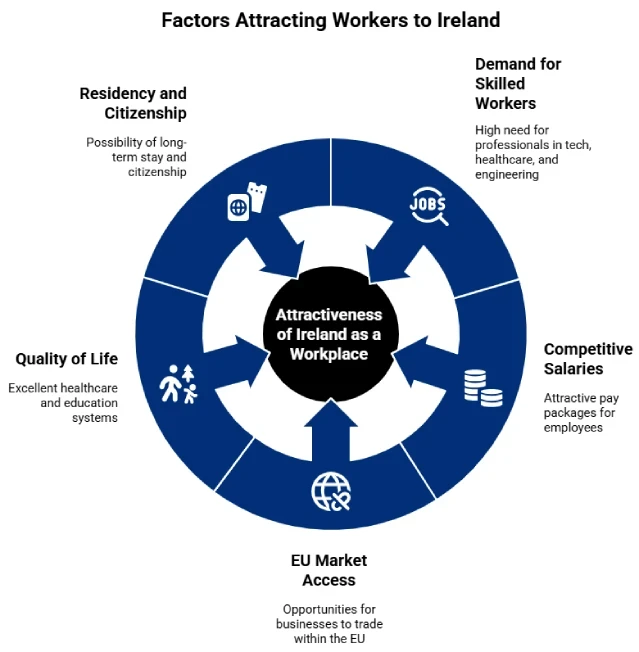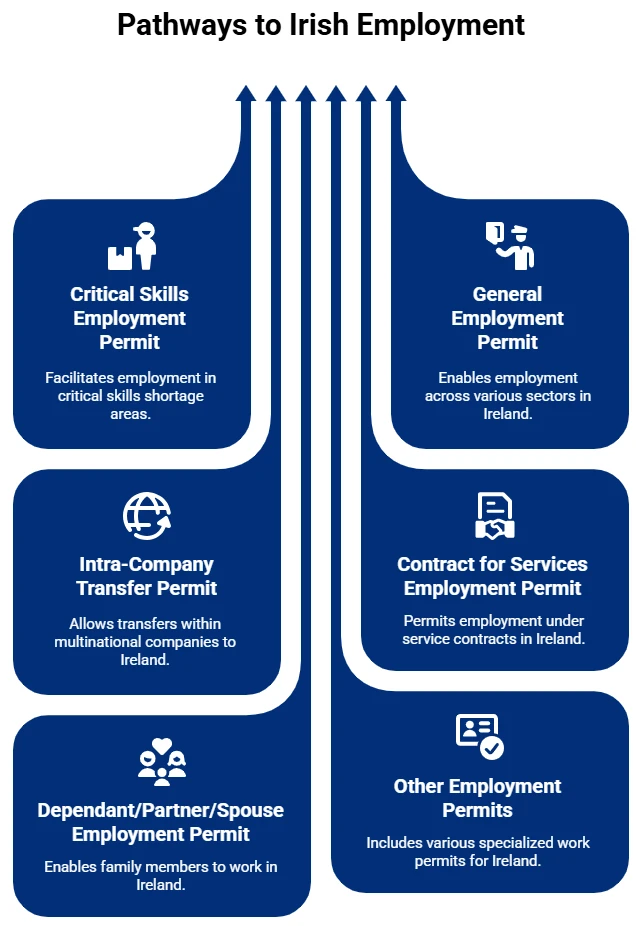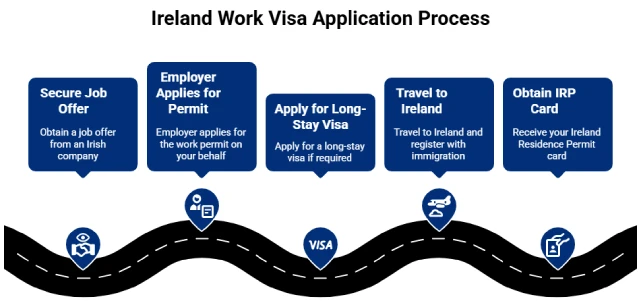Ireland is becoming a popular spot for professionals across the globe because of its strong economy, the need for skilled people, and the fact that English is spoken there. If you’re considering working in Ireland, here’s what you should know about getting a work visa in 2026.

*Want assistance to apply for work in Ireland? Sign up with Y-Axis is here to assist you with the process.
An Ireland Work Visa grants people from outside the EEA, like Canadians, the legal right to live and be employed in Ireland. Usually, you’ll need this visa in addition to an Employment Permit, which your Irish employer must apply for on your behalf.
The visa (Long Stay “D” Visa) allows you to enter Ireland. The employment permit allows you to work in a specific job for a certain employer. This two-step procedure makes sure everything follows Irish immigration laws and addresses the needs of the Irish job market.

*Looking for assistance to apply for work overseas? Y-Axis is here to guide you with the process.
Some of the benefits of an Ireland Work Visa are given below.
Ireland offers various types of work visas. Some of the popular ones are:

The Ireland Critical Skills Employment Permit aims to attract skilled workers from outside the European Economic Area (EEA), including those from Canada, to fill jobs where there are worker shortages in Ireland.
This permit suits professionals in fields like IT, healthcare, engineering, and finance, and it offers some benefits:
These salary requirements make sure the permit goes to professionals in roles that are in demand and well-paid. They also give Canada-based applicants a clear idea of how to qualify.
*Want to apply for jobs abroad? Y-Axis is here to offer you the required support with the process.
The General Employment Permit lets non-EEA citizens, such as Canadians, work in Ireland in jobs not on the Critical Skills Occupations List.
The Ireland Intra-Company Transfer (ICT) Employment Permit lets global firms move staff from an overseas branch or related company to their Irish location. This is suited for managers, important staff, or those in training who need to work in Ireland for a short time.
The Ireland Contract for Services Employment Permit is for people from outside the EEA, such as Canadians, who work for a company based abroad that has a service contract with an Irish business. It lets the company send its workers to Ireland for a short time to fulfill the contract.
This applies to workers who are not directly employed by an Irish company but are instead sent over under a service contract. The worker must have been with the foreign company for at least half a year before being sent to Ireland. Usually, a check to see if there is a need for this worker in the Irish job market is needed, but there are exceptions.
The Ireland Dependant/Partner/Spouse Employment Permit lets relatives of some employment permit holders (such as those with Critical Skills Employment Permits) reside and be employed in Ireland. It is made for relatives of foreign citizens working in Ireland with the correct permits.
Ireland's Other Employment Permits cater to job roles not covered by standard permits such as Critical Skills or General Employment Permits. These permits address particular scenarios and specialized positions to help Ireland's economy, culture, and society.
Examples include:
Each of these permits has its own rules for who can apply, how long it lasts, and what salary is required.
The eligibility criteria for an Ireland Work Visa include:
The documents required to apply for Ireland Work Visa are given below.
The process to apply for an Ireland Work Visa is given below.
Step 1: Secure a job offer from an Irish company.
Step 2: Have your employer apply for your work permit.
Step 3: After the permit is approved, if needed, apply for a long-stay visa.
Step 4: Travel to Ireland and register with immigration within 90 days of arrival.
Step 5: Get your Ireland Residence Permit (IRP) card.

Detailed information about the fees required to apply for Ireland work visa.
| Type of Fee | Amount (EUR) |
| Employment Permit (up to 6 months) | € 500 |
| Employment Permit (up to 2 years) | € 1,000 |
| Employment Permit Renewal (up to 3 years) | € 1,500 |
| Long-Stay Visa (Visa D) | € 60 |
| Stamp Registration Fee (Irish Residence Permit) | € 300 |
Detailed information about the processing time for Ireland Work Visa is given below.
| Type of Employment Permit | Estimated Processing Time |
| Critical Skills Employment Permit | 6–8 weeks |
| General Employment Permit | 8–12 weeks |
| Intra-Company Transfer Permit | 6–10 weeks |
| Contract for Services Employment Permit | 8–12 weeks |
| Dependant/Partner/Spouse Employment Permit | 4–6 weeks |
| Other Employment Permits | 6–10 weeks |
| Long-Stay Visa (Visa D) | 4–6 weeks (after permit approval) |
Details about the renewal and extension of Ireland Work visas are given below.
| Stage | Validity | Key Details |
| Initial Employment Permit | Up to 2 years | Issued for Critical Skills, General, and other employment permits. |
| First Renewal | Up to 3 years | Apply at least 12 weeks before expiry; renewal fee is €1,500. |
| Stamp 4 Permission | After 5 years of residence | Allows you to work in Ireland without an employment permit; step towards long-term residency. |
| Long-Term Residency | After 5 years of legal stay | Eligible to apply for permanent residency; can later apply for Irish citizenship. |
The possible challenges and tips to overcome them for a successful Ireland work visa application are given below.
| Challenge | Tip for Success |
| Delays in Labour Market Needs Test | Target occupations on the Critical Skills list to bypass the test and speed up the process. |
| Complex and time-consuming documentation | Start preparing early and ensure all documents are complete, certified, and translated if required. |
| Visa and permit processing backlogs | Apply well in advance of your planned start date to avoid last-minute issues. |
| Employer's unfamiliarity with the process | Work with companies experienced in hiring non-EU workers or consult Irish immigration guidelines. |
| Language barriers (for General permits) | Learn basic English and/or Irish workplace terms to ease communication during and after the application. |
Y-Axis offers advice to help people move to other countries for work. We assist professionals with their Ireland work visa applications by giving expert help throughout the whole process.
Our services include:
Yes, Canadian residents need a visa to work in Ireland. Canadians who want to work in Ireland need a visa or work permit, even though they do not need a tourist visa for visits of up to 90 days. The visa-free entry does not allow work.
To work in Ireland, Canadians have to apply for a work permit, like the Critical Skills Employment Permit or the General Employment Permit. The permit needed depends on the job and salary. Either the employer or the applicant needs to apply through Ireland’s Department of Enterprise, Trade and Employment (DETE) before starting the job.
You cannot enter Ireland to work without getting a permit first.
The Critical Skills Employment Permit aims to bring skilled workers to Ireland for jobs where there are shortages, like IT, healthcare, engineering, and finance. To be eligible, the job needs to be on the Critical Skills Occupation List and pay at least €38,000–€64,000, depending on the job. This permit lasts two years and can lead to long-term residency. Family members can come to Ireland, and there’s a quicker way to apply for Stamp 4, which is residency without job limits.
The General Employment Permit allows non-EU citizens, including Canadians, to work in jobs that aren't on a restricted list. This permit is usually granted for up to two years at first and can be extended, but the total time allowed on this permit is five years. There's a minimum salary requirement of €30,000 annually, though some jobs require a higher salary. To get the permit, you might need to prove that there were no qualified EU/EEA citizens available for the job. After holding this permit for five years, you can apply for long-term residency (Stamp 4).
The processing times for Ireland work visa are given below.
| Type of Employment Permit | Estimated Processing Time |
| Critical Skills Employment Permit | 6–8 weeks |
| General Employment Permit | 8–12 weeks |
| Intra-Company Transfer Permit | 6–10 weeks |
| Contract for Services Employment Permit | 8–12 weeks |
| Dependant/Partner/Spouse Employment Permit | 4–6 weeks |
| Other Employment Permits | 6–10 weeks |
| Long-Stay Visa (Visa D) | 4–6 weeks (after permit approval) |
Yes, you can bring your family on an Ireland work visa. If you have a Critical Skills Employment Permit, your immediate family can come to Ireland. They can apply for Stamp 1G or Stamp 3, depending on their situation. Spouses of Critical Skills permit holders can also apply for their own work permit and, if approved, can work without any restrictions. Those with a General Employment Permit can bring their family to Ireland after one year, but this depends on meeting certain income and housing requirements. Each family member needs to apply for the correct visa and residence permit through immigration services.
Yes, you can switch employers on an Ireland work visa, provided you fulfil certain requirements. Individuals under a Critical Skills Employment Permit typically must remain with their initial employer for a minimum of 12 months before changing jobs. Afterward, a job change requires approval beforehand. General Employment Permit holders also need the Department of Enterprise, Trade and Employment's approval for job changes. A fresh permit application is usually needed, and the new position must still meet requirements. Changing jobs without authorization can put your work permit or immigration status at risk of being cancelled.
No, there is no language requirement for an Ireland work visa. When applying for an Irish work visa or work permit, a standard English test may be needed. Good English skills are key for most jobs, mainly in areas such as healthcare, teaching, finance, and customer support. Bosses might check your language skills when you apply. Some jobs, like nursing or teaching, might need a certificate or permission, which could include proof of your English level, such as IELTS or OET. Even if it's not needed for the visa, good speaking and writing skills greatly help you get a job and do well in it.
The documents required to apply for an Ireland Work Visa are given below.
Keep in mind that depending on the type of permit, there may be other documents required. Always check the document list from the Department of Enterprise, Trade and Employment and the Irish Naturalisation and Immigration Service (INIS) to be sure.
Yes, you can apply for permanent residency in Ireland if you have a valid Irish Work Visa. International professionals with a current Irish work permit can seek long-term residency (Stamp 4) if they have lived and worked in Ireland legally for 5 years straight. Those who hold a Critical Skills Employment Permit may be able to apply after 2 years. Long-term residency lets people live and work in Ireland without needing a work permit. After living there legally for 5 years, some may also apply for Irish citizenship if they fulfill the character and residency rules.
The Stamp 4 immigration permission allows non-EU people to live and work in Ireland without needing a work permit. Those who hold a Critical Skills Employment Permit can apply for this after 21 months on the job, while General Employment Permit holders can apply after five years. Once approved, Stamp 4 gives full work rights and can be renewed. It is also needed when applying for long-term residency or Irish citizenship. Applications are submitted through the Irish Immigration Service and local registration offices.